Monthly Updates on Recent Books in the History of Christianity
To raise awareness of recent books in the history of Christianity, the editorial staff of Church History: Studies in Christianity and Culture highlights each month a list of 10-15 books in diverse periods and geographical regions that we hope will be of interest to our members. We include here below the seventh monthly list, chosen by our staff, with excerpts from the publishers’ blurbs.
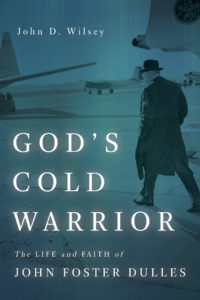
John D. Wilsey, God’s Cold Warrior: The Life and Faith of John Foster Dulles. 2021
When John Foster Dulles died in 1959, he was given the largest American state funeral since Franklin Delano Roosevelt’s in 1945. President Eisenhower called Dulles—his longtime secretary of state—“one of the truly great men of our time,” and a few years later the new commercial airport outside Washington, DC, was christened the Dulles International Airport in his honor. His star has fallen significantly since that time, but his influence remains indelible—most especially regarding his role in bringing the worldview of American exceptionalism to the forefront of US foreign policy during the Cold War era, a worldview that has long outlived him.
God’s Cold Warrior recounts how Dulles’s faith commitments from his Presbyterian upbringing found fertile soil in the anti-communist crusades of the mid-twentieth century. After attending the Oxford Ecumenical Church Conference in 1937, he wrote about his realization that “the spirit of Christianity, of which I learned as a boy, was really that of which the world now stood in very great need, not merely to save souls, but to solve the practical problems of international affairs.” Dulles believed that America was chosen by God to defend the freedom of all those vulnerable to the godless tyranny of communism, and he carried out this religious vision in every aspect of his diplomatic and political work. He was conspicuous among those US officials in the twentieth century that prominently combined their religious convictions and public service, making his life and faith key to understanding the interconnectedness of God and country in US foreign affairs.
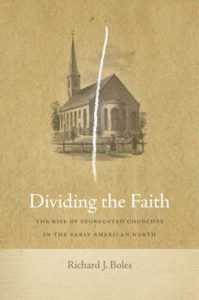
Richard J. Boles, Dividing the Faith: The Rise of Segregated Churches in the Early American North. 2020
Phillis Wheatley was stolen from her family in Senegambia, and, in 1761, slave traders transported her to Boston, Massachusetts, to be sold. She was purchased by the Wheatley family who treated Phillis far better than most eighteenth-century slaves could hope, and she received a thorough education while still, of course, longing for her freedom. After four years, Wheatley began writing religious poetry. She was baptized and became a member of a predominantly white Congregational church in Boston. More than ten years after her enslavement began, some of her poetry was published in London, England, as a book titled Poems on Various Subjects, Religious and Moral. This book is evidence that her experience of enslavement was exceptional.
Wheatley remains the most famous black Christian of the colonial era. Though her experiences and accomplishments were unique, her religious affiliation with a predominantly white church was quite ordinary. Dividing the Faith argues that, contrary to the traditional scholarly consensus, a significant portion of northern Protestants worshipped in interracial contexts during the eighteenth century. Yet in another fifty years, such an affiliation would become increasingly rare as churches were by-and-large segregated.
Richard Boles draws from the records of over four hundred congregations to scrutinize the factors that made different Christian traditions either accessible or inaccessible to African American and American Indian peoples. By including Indians, Afro-Indians, and black people in the study of race and religion in the North, this research breaks new ground and uses patterns of church participation to illuminate broader social histories. Overall, it explains the dynamic history of racial integration and segregation in northern colonies and states.
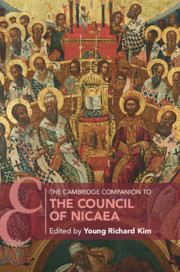
Young Richard Kim, ed. The Cambridge Companion to the Council of Nicaea. 2021
Every Sunday, Christians all over the world recite the Nicene Creed as a confession of faith. While most do not know the details of the controversy that led to its composition, they are aware that the Council of Nicaea was a critical moment in the history of Christianity. For scholars, the Council has long been a subject of multi-disciplinary interest and continues to fascinate and inspire research. As we approach the 1700th anniversary of the Council, The Cambridge Companion to the Council of Nicaea provides an opportunity to revisit and reflect on old discussions, propose new approaches and interpretative frameworks, and ultimately revitalize a conversation that remains as important now as it was in the fourth century. The volume offers fifteen original studies by scholars who each examine an aspect of the Council. Informed by interdisciplinary approaches, the essays demonstrate its profound legacy with fresh, sometimes provocative, but always intellectually rich ideas.
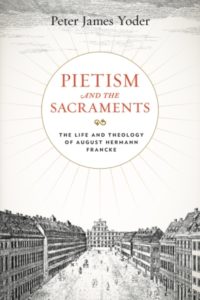
Peter James Yoder, Pietism and the Sacraments: The Life and Theology of August Hermann Francke. 2021
The Pennsylvania State University Press
Considered by many to be one of the most influential German Pietists, August Hermann Francke lived during a moment when an emphasis on conversion was beginning to produce small shifts in how the sacraments were defined—a harbinger of later, more dramatic changes to come in evangelical theology. In this book, Peter James Yoder uses Francke and his theology as a case study for the ecclesiological stirrings that led to the rise of evangelicalism and global Protestantism.
Engaging extensively with Francke’s manuscript sermons and writings, Yoder approaches Francke’s life and religious thought through his theology of the sacraments. In doing so, Yoder delivers key insights into the structure of Francke's Pietist thought, providing a rich depiction of his conversion-driven theology and how it shaped his views of the sacraments and the church. The first in-depth study of Francke’s theology written for an English-speaking audience, this book supports recent scholarship in English that not only challenges long-held assumptions about Pietism but also argues for the role of Pietism’s influence on the changing religious landscape of the eighteenth century. Through his examination of Francke’s theology of the sacraments, Yoder presents a fresh view into the eighteenth-century ecclesiological developments that caused a rupture with the dogmas of the Reformation.
Original and vital, this study recognizes Francke’s importance to the history of Pietism in Germany and beyond. It will become the standard reference on Francke for American audiences and will influence scholarship on Lutheranism, Pietism, early modern German studies, and eighteenth-century history and religion.
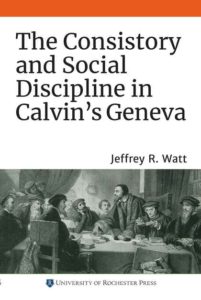
Jeffrey R. Watt, The Consistory and Social Discipline in Calvin’s Geneva. 2020
University of Rochester Press/Boydell and Brewer
Created by John Calvin, the Consistory of Geneva was a quasi-tribunal entrusted with enforcing Reformed morality. Comprised of pastors and elders, this body met weekly and summoned people for a wide range of "sinful" behavior, such as drunkenness, dancing, blasphemy, or simply quarrels, and was a far more intrusive institution than the Catholic Inquisition. Among the thousands summoned during Calvin's ministry were a pair of women who were allegedly prophets, boys who skipped catechism to practice martial arts, and a good number of people begging for forgiveness for having renounced Protestantism out of fear of death.
This superbly researched book, reflecting author Jeffrey Watt's career-long involvement in the ongoing project of transcribing, editing, and publishing the Consistory records, is the first comprehensive examination of this morals court and provides a window into the reception of the Reformation in the so-called Protestant Rome. Watt examines the role of the Consistory in upholding patriarchy, showing that while Genevan authorities did not have a double standard in prosecuting illicit sexuality, the Consistory exhorted women to obey even violently abusive husbands. He finds also that Calvin and his colleagues vigorously promoted a strong work ethic by censuring people, mostly men, for laziness, and showed a surprising degree of skepticism toward accusations of witchcraft. Finally, Watt demonstrates convincingly that, while the Consistory encountered some resistance, Genevans by and large shared the ideals it promoted and that it enjoyed considerable success in fostering discipline in Genevan society.
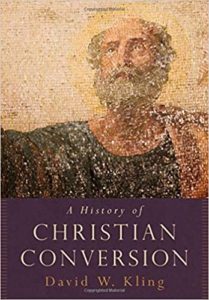
David W. Kling, A History of Christian Conversion. 2020
Conversion has played a central role in the history of Christianity. In this first in-depth and wide-ranging narrative history, David Kling examines the dynamic of turning to the Christian faith by individuals, families, and people groups. Global in reach, the narrative progresses from early Christian beginnings in the Roman world to Christianity's expansion into Europe, the Americas, China, India, and Africa. Conversion is often associated with a particular strand of modern Christianity (evangelical) and a particular type of experience (sudden, overwhelming). However, when examined over two millennia, it emerges as a phenomenon far more complex than any one-dimensional profile would suggest. No single, unitary paradigm defines conversion and no easily explicable process accounts for why people convert to Christianity. Rather, a multiplicity of factors-historical, personal, social, geographical, theological, psychological, and cultural-shape the converting process.
A History of Christian Conversion not only narrates the conversions of select individuals and peoples, it also engages current theories and models to explain conversion, and examines recurring themes in the conversion process: divine presence, gender and the body, agency and motivation, testimony and memory, group- and self-identity, "authentic" and "nominal" conversion, and modes of communication. Accessible to scholars, students, and those with a general interest in conversion, Kling's book is the most satisfying and comprehensive account of conversion in Christian history to date; this major work will become a standard must-read in conversion studies.
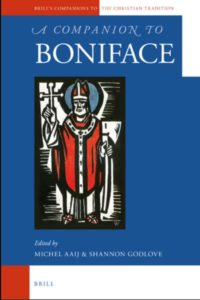
Michel Aaij and Shannon Godlove, eds. A Companion to Boniface. 2020
The eighth-century English missionary and church reformer Boniface was a highly influential figure in early medieval Europe. His career in what is now Germany, France, and the Netherlands is attested in an exceptional number of textual sources: a correspondence of 150 letters, Latin poetry, church council records, and other documents. Numerous saints’ lives and modern devotional materials further reveal how he was and is remembered by the religious communities that claim him as a foundational figure.
This volume comprises the latest scholarship on Boniface and his fellow missionaries, examining the written materials associated with Boniface, his impacts on the regions of Europe where he worked (Hessia, Thuringia, Bavaria, Frisia, and Francia), and the development of his cult in the Middle Ages and today.

David Aers, Versions of Election: From Langland and Aquinas to Calvin and Milton. 2020
Concepts of predestination and reprobation were central issues in the Protestant Reformation, especially within Calvinist churches, and thus have often been studied primarily in the historical context of the sixteenth and seventeenth centuries. In Versions of Election: From Langland and Aquinas to Calvin and Milton, David Aers takes a longer view of these key issues in Christian theology. With meticulous attention to the texts of medieval and early modern theologians, poets, and popular writers, this book argues that we can understand the full complexity of the history of various teachings on the doctrine of election only through a detailed diachronic study that takes account of multiple periods and disciplines. Throughout this wide-ranging study, Aers examines how various versions of predestination and reprobation emerge and re-emerge in Christian tradition from the Middle Ages through the seventeenth century. Starting with incisive readings of medieval works by figures such as William Langland, Thomas Aquinas, and Robert Holcot, and continuing on to a nuanced consideration of texts by Protestant thinkers and writers, including John Calvin, Arthur Dent, William Twisse, and John Milton (among others), Aers traces the twisting and unpredictable history of prominent versions of predestination and reprobation across the divide of the Reformation and through a wide variety of genres. In so doing, Aers offers not only a detailed study of election but also important insights into how Christian tradition is made, unmade, and remade.
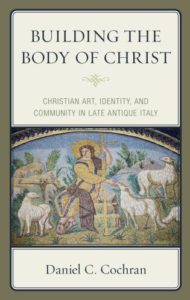
Daniel Cochran, Building the Body of Christ: Christian Art, Identity, and Community in Late Antique Italy. 2020
In Building the Body of Christ, Daniel C. Cochran argues that monumental Christian art and architecture played a crucial role in the formation of individual and communal identities in late antique Italy. The ecclesiastical buildings and artistic programs that emerged during the fourth and fifth centuries not only reflected Christianity’s changing status within the Roman Empire but also actively shaped those who used them. Emphasizing the importance of materiality and the body in early Christian thought and practice, Cochran shows how bishops and their supporters employed the visual arts to present a Christian identity rooted in the sacred past but expressed in the present through church unity and episcopal authority. He weaves together archaeological and textual evidence to contextualize case studies from Rome, Aquileia, and Ravenna, showing how these sites responded to the diversity of early Christianity as expressed through private rituals and the imperial appropriation of the saints. Cochran shows how these early ecclesiastical buildings and artistic programs worked in conjunction with the liturgy to persuade individuals to adopt alternative beliefs, practices, and values that contributed to the formation of institutional Christianity and the “Christianization” of late antique Italy.
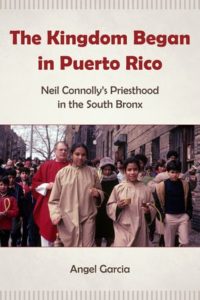
Angel Garcia, The Kingdom Began in Puerto Rico: Neil Connolly’s Priesthood in the South Bronx. 2021
Set in the historical context of a changing world and a changing Catholic Church, The Kingdom Began in Puerto Rico follows Fr. Neil Connolly’s path through the South Bronx, which began with a special Church program to address the postwar great Puerto Rican migration. After an immersion summer in Puerto Rico, Fr. Neil served the largest concentration of Puerto Ricans in the Bronx from the 1960s to the 1980s as they struggled for a decent life. Through the teachings of Vatican II, Connolly assumed responsibility for creating a new Church and world. In the war against drugs, poverty, and crime, Connolly created a dynamic organization and chapel run by the people and supported Unitas, a nationally unique peer-driven mental health program for youth. Frustrated by the lack of institutional responses to his community’s challenges, Connolly challenged government abandonment and spoke out against ill-conceived public plans. Ultimately, he realized that his priestly mission was in developing new leaders among people, in the Church and the world, and supporting two nationally unique lay leadership programs, the Pastoral Center and People for Change.
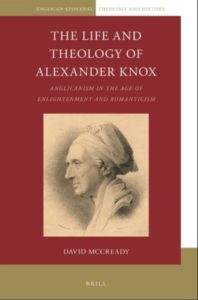
David McCready, The Life and Theology of Alexander Knox: Anglicanism in the Age of Enlightenment and Romanticism. 2020
In his The Life and Theology of Alexander Knox, David McCready highlights one of the most important figures in the history of Anglicanism. A disciple of John Wesley, Knox presents his mentor as a representative of the Neo-Platonic tradition within Anglicanism, a tradition that Knox himself also exemplifies. Knox also significantly impacted John Henry Newman and the Tractarians. But Alexander Knox is an important theologian in his own right, one who engaged substantially with the main intellectual currents of his day, namely those stemming from the Enlightenment and Romanticism. Meshing Knox’s theological teaching on various topics with details of his life, this book offers a fascinating portrait of a man who, in the words of Samuel Taylor Coleridge ‘changed the minds, and, with them, the acts of thousands.’

Stephen Murray, Notre-Dame of Amiens: Life of the Gothic Cathedral. 2020
Notre-Dame of Amiens is one of the great Gothic cathedrals. Its construction began in 1220, and artistic production in the Gothic mode lasted well into the sixteenth century. In this magisterial chronicle, Stephen Murray invites readers to see the cathedral as more than just a thing of the past: it is a living document of medieval Christian society that endures in our own time.
Murray tells the cathedral’s story from the overlapping perspectives of the social groups connected to it, exploring the ways that the layfolk who visit the cathedral occasionally, the clergy who use it daily, and the artisans who created it have interacted with the building over the centuries. He considers the cycles of human activity around the cathedral and shows how groups of makers and users have been inextricably intertwined in collaboration and, occasionally, conflict. The book travels around and through the spaces of the cathedral, allowing us to re-create similar passages by our medieval predecessors. Murray reveals the many worlds of the cathedral and brings them together in the architectural triumph of its central space.
A beautifully illustrated account of a grand, historically and religiously important building from a variety of perspectives and in a variety of time periods, this book offers readers a memorable tour of Notre-Dame of Amiens that celebrates the cathedral’s eight hundredth anniversary.
Finally, for staying up-to-date on the latest titles in all fields, we recommend regularly perusing New Books Network and its "New Books in Christian Studies” page. These pages are updated regularly.
